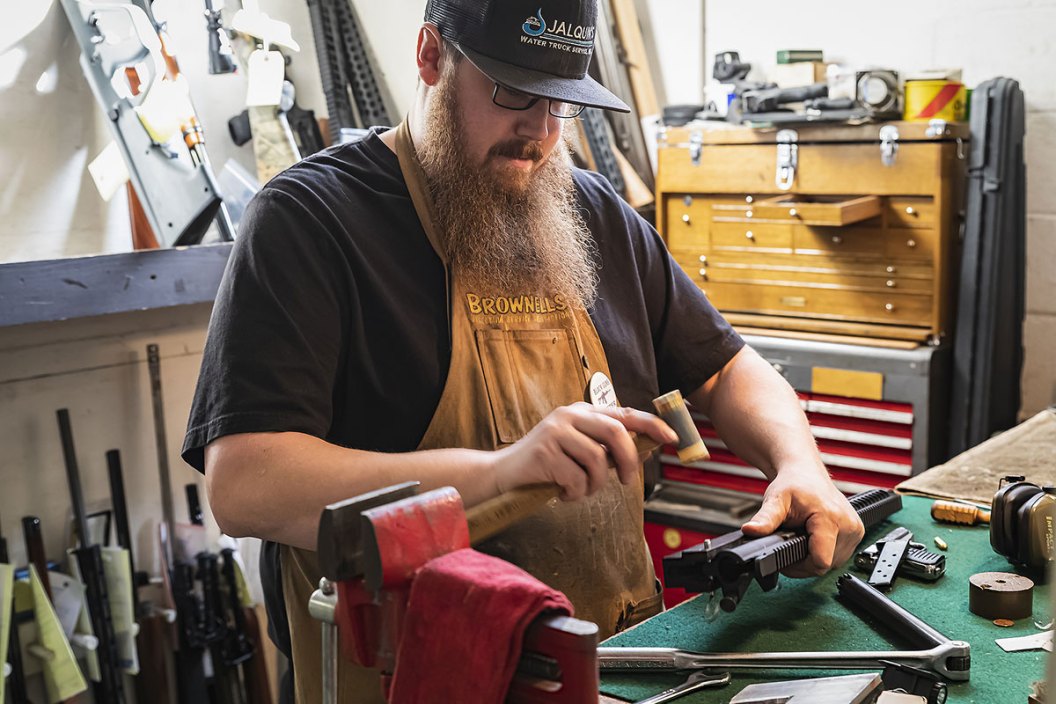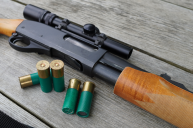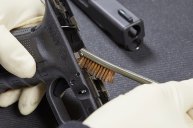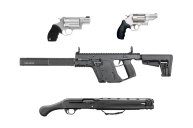A gunsmith has to be really good at doing a whole lot of different things.
What is a gunsmith? In short, it is someone who designs, makes, or repairs firearms.
Now, we tend to put gun designers in a separate category. Whereas they create guns designs from scratch and usually work for a gun manufacturer of some kind, a gunsmith typically works in more of a firearm repair and customization capacity.
One doesn't think of John M. Browning as a gunsmith, though he certainly was one, but more as an inventor.
However, these days, with technology like 3D printing and the ability to virtually designs firearms parts or a complete firearm without doing any machining work, those dividing lines are becoming muddled.
A jack-of-all-trades gunsmith has to be a bit of a machinist, a bit of an engineer, a good woodworker, and they have to know how people use firearms for different purposes. These days, it also helps to know how to work with polymers, Cerakote, and laser etching.
How to Become a Gunsmith
Like many trades, gunsmithing requires certification from an accredited trade school or community college that offers a gunsmithing degree program. Some high schools will even offer gunsmithing classes.
After completing a gunsmith program, the path typically includes an apprenticeship during a training period before someone becomes a full fledged gunsmith.
Regardless, to work as a gunsmith in the United States, one needs a Federal Firearms License (FFL), as regulated by the Bureau of Alcohol, Tobacco, Firearms and Explosives (ATF), which includes an extensive background check.
How Much a Gunsmith Makes
During an apprenticeship, salaries are typically about $25,400. At the higher end of the spectrum, a certified gunsmith can make between $50,000 and $60,000 a year depending on their location. The average salary for a gunsmith in the U.S. is $36,200, according to the Bureau of Labor Statistics.
Self-employed gunsmiths who own their own business and those who work with one or more small gun shops typically make the most, but those who work for big companies, large chains, sporting goods stores, or gun ranges often get the perks of health insurance and other benefits. Of course, that situation is limited by the company's pay scale.
What a Gunsmith Does Day to Day
A gunsmith is expected to be proficient in metalworking, woodworking, lathe work and with using power tools and hand tools in tandem.
They must be able to fully disassemble and reassemble practically any handgun, rifle, or shotgun brought in by a customer, and, at the highest level, manufacture small parts for repairs. There was a time when a high-end gunsmith's workshop would be part machine shop with milling machines and lathes, and part woodworking shop for repairing and creating stocks and bedding actions. These days, it's getting harder and harder to find a gunsmith who is also a stockmaker, thanks to synthetic materials.
Many gunsmiths will also be experts at applying protective finishes to firearms, from old-school blueing to custom Cerakoting, and have the necessary tools to do so.
In some states where firearm features are strictly regulated, gunsmiths do a lot of "compliance work." For example, there are rules in New Jersey regarding certain features on an AR. It cannot have an adjustable stock, and it can't have a threaded barrel. If a muzzle device, like a compensator or a muzzle brake, is pinned and welded to the muzzle, it becomes compliant. If an adjustable stock is pinned and fixed in one position, it becomes compliant. You can bet NJ gunsmiths do a whole lot of that kind of work for their customers.
https://www.instagram.com/p/CPZN2ecLn1K/
Of course, some gunsmiths develop a specialization and focus on, say, making custom barrels, or customizing 1911s in a specific way. Sometimes this kind of extensive customization work evolves so much that a gunsmith practically becomes a firearms manufacturer.
Law enforcement agencies will often employ gunsmiths as armorers, who maintain, catalog, and issue a given agency's arsenal. A few gunsmiths have been able to create careers as Hollywood armorers, providing and customizing firearms for movies and TV.
These days, the number of home "gunsmiths" out there is greater than ever, as people can pretty much order any specialized tool they might need online. Plus, that's the same place they'll find a number of step-by-step video instructions for doing everything from repairing a cracked stock to re-crowning a gun barrel.
But there's no substitute for knowing how to use those specialized tools, because experience is the only way to get any good. That's true for most any job, but especially true for a trade like gunsmithing.
NEXT: 8 MILITARY SURPLUS GUNS THAT LET YOU OWN A PIECE OF HISTORY
WATCH





